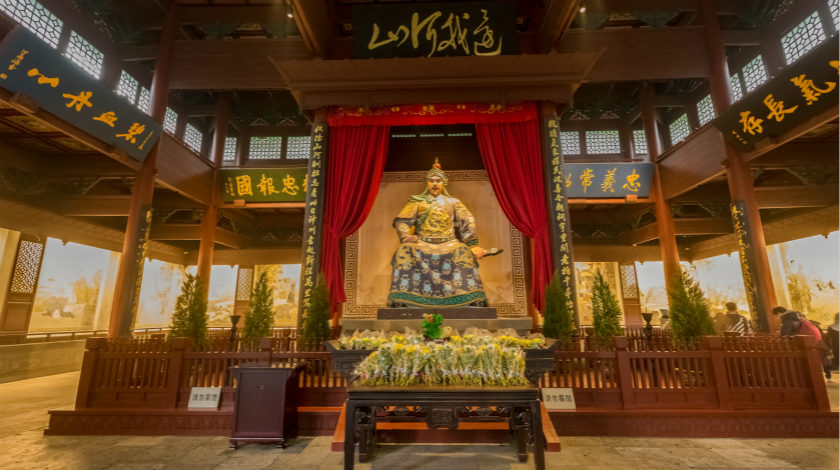Chinese Name: 岳王庙 Pronunciation: yuè wáng miào
Building Time: 1221
Recommended Time for Visit: 1 Hour
Best Visiting Season: All seasons
Opening Hours: 08:00-17:00
Occupied Area: About 15,700 square meters
Building Function: The tomb of General Yue Fei
Popular Activities: People pay tribute to General Yue Fei
Address: No.80 Beishan Road, West Lake District, Hangzhou, Zhejiang Province
| Tourists | Ticket Price |
| Adults | CNY 25 |
|
Children from 1.2-1.5 meters; |
CNY 12.5 |
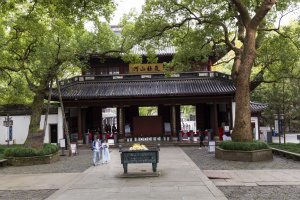
The Yue Fei Temple is situated at the northwest of the West Lake. It is the largest memorial hall of general Yue Fei in China. The entire scenic area is divided into the tomb area and the temple area, including the Zhonglie Hall, the Qizhong Hall and the Yue Fei Temple. Wandering here, you will learn many historical stories about this famous figure.
The Yue Fei Temple was listed as a national key cultural relic unit, the patriotic education base construction project in Hangzhou, and one of the patriotic education bases in Zhejiang province. People who come here always purchase a bunch of flowers to pay tribute to this famous patriotic general.
From November 20, 2020, the Yue Fei Temple is under a 300-day maintenance project. During the period, the temple is still open to visitors.
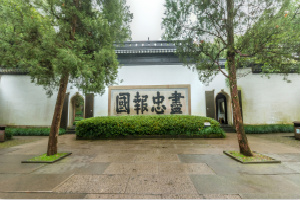
Built in 1221, the fourteenth year of the Jiading period during the reign of Emperor Ningzong of the Southern Song Dynasty (1127-1129), the Yue Fei Temple is set as an important place for memorizing Yue Fei.
It was renamed as “Zhonglie Temple” (忠烈庙, the temple for the national hero) during the Jingtai period in the reign of Emperor Daizong of the Ming Dynasty (1368-1644).
The current temple is reconstructed on the original site and was preserved during the reign of Emperor Kangxi of the Qing Dynasty (1636-1911).
It was restored in 1918 and 1979 successively.
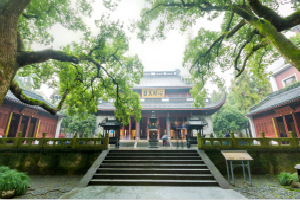
The gate of the Yue Fei Temple is a two-storied building. A plaque engraved “Yue Fei Temple” is hanging over the gate. In the two sides of the gate hangs the couplet ‘Thirty years: rank and honour, just so much dust; Eight hundred leagues: travelling with the moon and clouds.’,(三十功名尘与土,八千里路云和月) excerpted from the poem The River All Red (《满江红》), composed by Yue Fei.
Crossing the gate, you will see the Zhonglie Hall. Inside the hall, a statue of Yue Fei with his martial attire is standing in the center. This statue is as high as 4.5 meters. A plaque with Chinese characters “xin zhao tian ri” (心昭天日, Good deeds will be recognized by the public) hangs over the statue. The surrounding wall is decorated with murals recording Yue Fei’s life stories. They serve as important historical materials for people to understand this famous figure.
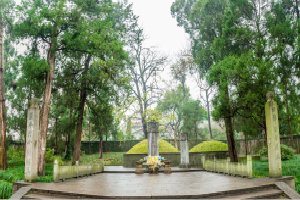
In front of the Yue Fei Temple, stands a screen wall with four Chinese characters “jin zhong bao guo” (尽忠报国, take own responsibility and make great contributions to the country). On the two sides of the screen wall, there is one long corridor respectively, which exhibit 125 stone steles of many dynasties, recording the poems of Yue Fei. Crossing the screen wall and running through a long corridor, you will see the tomb of General Yue Fei.
The tomb faces east and was built with bricks. The whole tomb is round and its gravestone is engraved “Tomb of Yue Ewang of the Song Dynasty” (宋岳鄂王墓). The tomb is 1.45 meters high and seven meters in diameter. On the left side is the tomb of Yue Yun, Yue Fei’s son.
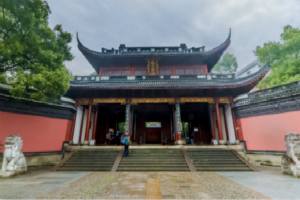
History has it that Yue Fei was framed by traitors when he was alive. After his death, a kind-hearted jailor interred him at the Beishan Mountain. In 1162, during the reign of Emperor of Xiaozong of the Song Dynasty, the wrong was righted. This emperor held a grand ritual in honor of Yue Fei and reinterred him at the southern hinterland of the Qixia Peak. Since then, the Yue Fei Temple has been restored and is still well preserved today.
The Tomb of Yue Fei is close to the Qixi Peak and facing the Sudi Causeway (苏堤). When the sun is going down, the whole tomb is covered by sunset glow, and is just like wearing an orange coat, hence gets the name “yue mu qi xia” (岳墓栖霞). The word “qi” (栖) in Chinese means the place in which one resides. The word “xia”(霞) in Chinese means the wonderful glow in the morning or evening, a symbol of pretty things or noble characters. So the phase “qi xia”(栖霞) is a racy metaphor that Yue Fei’s achievements need to be remembered, and his spirit of patriotism is worth eulogizing.
Enter from the Bixuedanxin Archway→ the Bronze Statue of Yue Fei→ the gate of the Yue Fei Temple→ the Zhonglie Hall→ the Jingzhong Bridge→ the Jingzhong Cypress Pavilion→ Stele Corridor→ the Tomb of Yue Fei→ the Tomb of Yue Yun→ the Qizhong Hall→ the Nanzhichao Hall→ the Zhengqi Hall→ Exit from the gate of the Yue Fei Temple
Take bus 7, 27, 51,52, 118 and get off at the Yue Fei Temple Station.
Chinese: 请带我去岳王庙。English: Please take me to the Yue Fei Temple.
If you go to the Yue Fei Temple from the center of Hangzhou (Zhejiang International Hotel), it takes about 25 minutes (about 20 yuan).
If you go to the Yue Fei Temple from Hangzhou Xiaoshan International Airport, it takes about 1 hour (about 100 yuan).
If you go to the Yue Fei Temple from Hangzhou Railway Station, it takes about 20 minutes (about 25 yuan).
If you go to the Yue Fei Temple from Hangzhou East Railway Station, it takes about 35 minutes (about 35 yuan).
If you go to the Yue Fei Temple from Hangzhou South Railway Station, it takes about 1 hour (about 80 yuan).
If you go to the Yue Fei Temple from Hangzhou North Bus Station, it takes about 1 hour (about 45 yuan).
